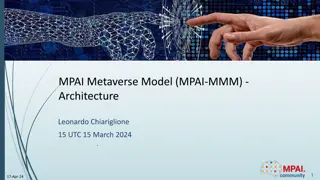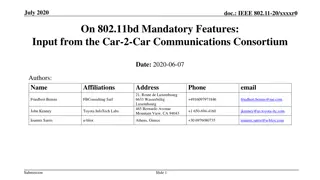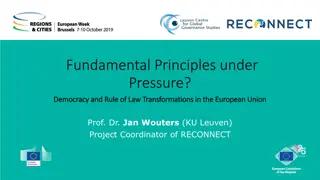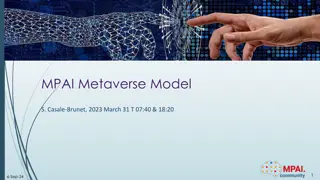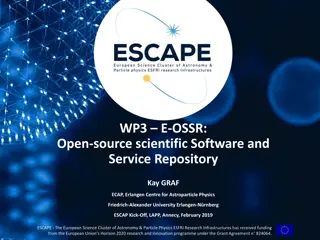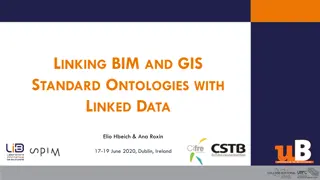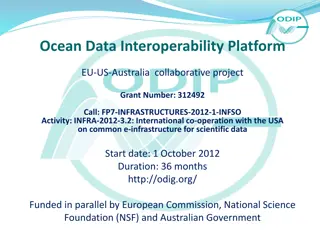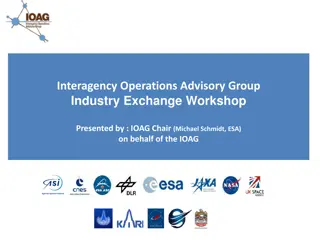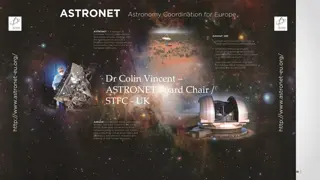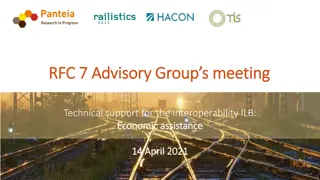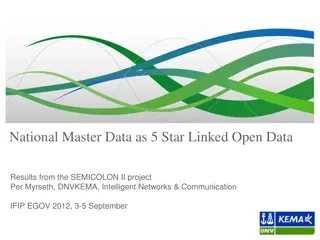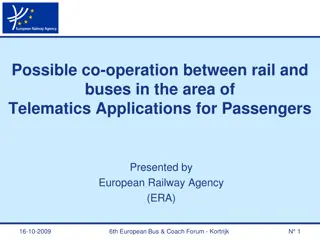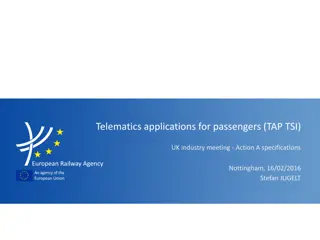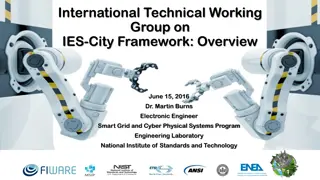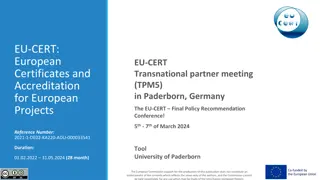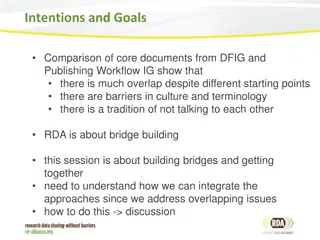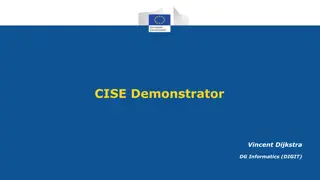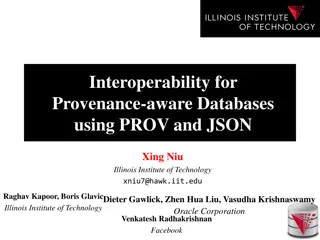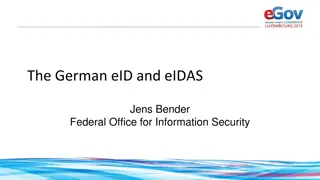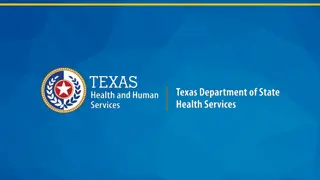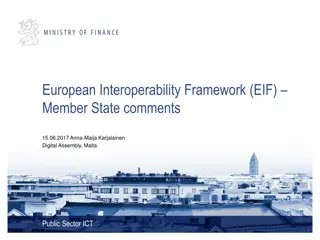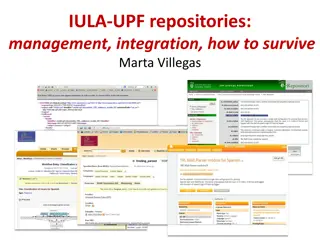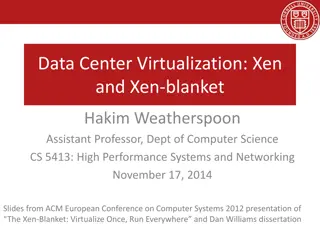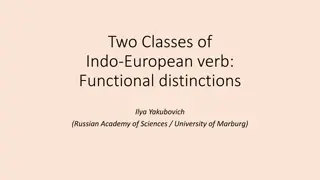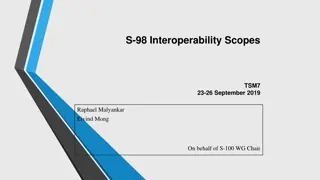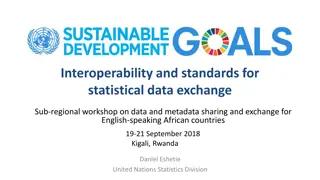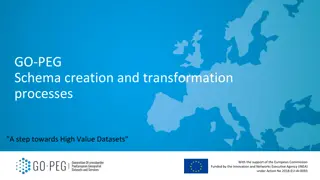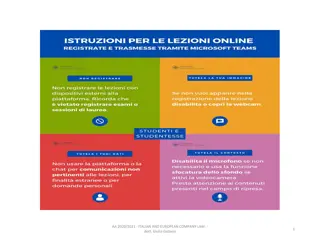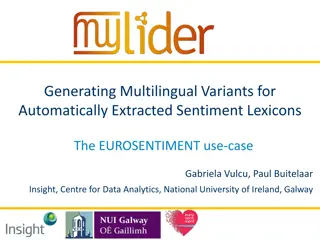Exploring the European Union and its Opportunities for Young People
The European Union (EU) is a political and economic union of 27 member states supporting lasting peace, human rights, freedom, and the free movement of people, goods, services, and capital. For young people, the EU offers job opportunities, youth events, travel and study opportunities, and initiativ
1 views • 18 slides
Understanding MPAI's Role in Metaverse Interoperability
MPAI, spearheaded by Leonardo Chiariglione, plays a crucial role in defining standards and technologies for the metaverse, ensuring interoperability between different metaverse instances. This involves functional and prescriptive interoperability, enabling seamless data exchange and operation models
3 views • 38 slides
Enhancing Wheat Data Interoperability for Sustainable Production
The wheat research community faces challenges in meeting the increasing demand for wheat production due to a lack of data harmonization and standards. The Wheat Data Interoperability Working Group aims to improve the interoperability of wheat-related data through shared guidelines, tools, and recomm
4 views • 10 slides
Proposal for New 802.11bd 20MHz Mode for Enhanced ITS Interoperability
The document discusses the necessity of a new 802.11bd 20MHz mode for improved interoperability within Intelligent Transportation Systems (ITS) due to limitations with current Wi-Fi channels and the scope of 256-QAM modulation. It presents proposals approved by the Car-2-Car Communications Consortiu
0 views • 8 slides
The Impact of Interoperability in Education
Explore the significance of interoperability in education through insightful statistics and data. Learn how improved interoperability can benefit CTOs, teachers, and schools. Discover the challenges and potential solutions related to the seamless sharing of data and digital tools in educational sett
0 views • 30 slides
Democracy and Rule of Law Transformations in the European Union
Democracy and the rule of law in the European Union are facing challenges such as backsliding and low voter turnout. This article discusses tools the EU can use to address these crises, ways to strengthen the link between the European Parliament and its citizens, factors affecting voter turnout in E
0 views • 10 slides
The Road to Metaverse Interoperability: Challenges and Solutions
Metaverse standards and interoperability are crucial for unleashing the full potential of this transformative technology. However, the lack of common agreement on what a metaverse entails poses challenges. The MPAI roadmap addresses key steps towards achieving interoperability, including developing
0 views • 17 slides
OpenFMB Framework: Empowering Utility Interoperability
Open Field Message Bus (OpenFMB) is a framework and reference architecture designed to enable interoperability for Distributed Intelligence Applications, focusing on cybersecurity, microgrids, Distributed Energy Resources (DER), and more. It provides a standard API for Electric Grid interoperability
0 views • 16 slides
Understanding XTCE and SEDS in Mission Operations
XTCE (XML Telemetric and Command Exchange) and SEDS (Space Experiments Data System) are essential tools in mission operations. XTCE serves as a standard database language for telemetry and commanding, while SEDS provides a platform for managing space experiment data. These tools are related through
1 views • 13 slides
ESCAPE Kick-Off Meeting for E-OSSR in European Science Cluster of Astronomy & Particle Physics
European Science Cluster of Astronomy & Particle Physics (ESCAPE) initiated the E-OSSR project to establish an open-source scientific software and service repository. The project aims to promote open science in the EOSC while following the FAIR principle. Funded by the European Union's Horizon 2020
0 views • 26 slides
Term Overlap Among Matportal Ontologies
The study focuses on term overlap among 5 Matportal ontologies, assessing interoperability and semantic ambiguity. Results show high rates of URI matches between specific ontologies, with discussions on the implications and potential solutions for enhancing interoperability.
0 views • 7 slides
Linking BIM and GIS Standard Ontologies with Linked Data
Introduction to the need for seamless data interpretation between Building Information Model (BIM) and Geographic Information System (GIS), focusing on aligning BIM and GIS standard ontologies for semantic interoperability. Addressing the challenges of data interoperability layers and the characteri
0 views • 15 slides
Ocean Data Interoperability Platform: EU-US-Australia Collaborative Project
This collaborative project, funded by the European Commission, National Science Foundation (NSF), and Australian Government, aims to develop a collaboration platform for organized dialogue between partners from Europe, the USA, and Australia. The project focuses on establishing a coordination platfo
0 views • 9 slides
Institutional Framework and Antitrust Law in the EU
The European Union's institutional framework is defined by the Treaties of Lisbon, European Union, and Functioning of European Union. These treaties establish the EU's objectives, governance principles, and delineate competences. Additionally, EU antitrust law principles are based on the Treaties of
0 views • 16 slides
Interagency Operations Advisory Group Industry Exchange Workshop Summary
The Interagency Operations Advisory Group (IOAG) facilitates collaboration among international agencies for space communications policy, procedures, and technical interfaces to ensure safe, secure, and efficient mission operations. It aims to enhance interoperability, network responsiveness, and thr
0 views • 30 slides
Comprehensive European Astronomy Development Planning by ASTRONET
ASTRONET, a group of European funding agencies and infrastructures, coordinates all aspects of European astronomy. Established in the early 2000s with EU funding, ASTRONET focuses on long-term planning for the development of European astronomy. It has created the European Science Vision and Infrastr
1 views • 7 slides
Analysis of Economic Assistance and Impacts on Interoperability at RFC-7 Advisory Group's Meeting
Overview of the RFC-7 Advisory Group's meeting discussing technical support for interoperability and economic assistance through the CBA methodology. The results from three case studies and the identification of remaining issues are presented, highlighting the direct and indirect impacts of solving
0 views • 6 slides
Improving Interoperability with Linked Open Data in the SEMICOLON II Project
The SEMICOLON II project aimed to enhance eGov solutions by utilizing Linked Open Data principles to open up public registers and create semantic technologies. The project spanned from 2007 to 2013 with a budget of approximately $15 million, focusing on core national master data maintenance and moti
0 views • 25 slides
European Railway Agency's Role in Promoting Cooperation between Rail and Buses in Telematics Applications
The European Railway Agency (ERA) plays a crucial role in enhancing cooperation between rail and buses through Telematics Applications. Established in 2004, ERA focuses on recommending legislation, ensuring interoperability, and enhancing safety in the European rail network. Recommendations made by
0 views • 17 slides
Overview of Telematics Applications for Passengers (TAP TSI) in European Rail Legislation
This presentation on Telematics Applications for Passengers (TAP TSI) in the UK industry meeting highlights the legal framework, functionalities, jargon used, and European rail legislation. It covers standards, technical specifications, abbreviations, and European legal documents governing passenger
0 views • 20 slides
Advancing Smart Cities: IES-City Framework Overview
The International Technical Working Group on IES-City Framework, led by Dr. Martin Burns, is developing a reference framework for IoT-enabled Smart City technologies to streamline architectural designs and enhance interoperability. The group aims to create a common set of features for Smart Cities,
0 views • 74 slides
EU-CERT: European Certificates and Accreditation for European Projects
The EU-CERT project involves European Certificates and Accreditation for European Projects, with upcoming events like the Transnational Partner Meeting (TPM5) in Paderborn, Germany, and the Final Policy Recommendation Conference in March 2024. The accreditation website tool and related information a
0 views • 4 slides
Building Bridges and Integrating Approaches in Research for Efficiency and Interoperability
Despite different starting points, there is significant overlap in the core documents of DFIG and Publishing Workflow IG. The session focuses on integrating approaches to address overlapping issues, with an emphasis on building bridges between diverse research cultures and terminology barriers. Key
0 views • 16 slides
European Commission CISE Demonstrator Project Overview
The European Commission CISE Demonstrator project led by Vincent Dijkstra from DG Informatics aims to identify service specifications, facilitate cooperation between Member States, and test concepts for exchanging information between service consumers and providers. The project follows a bottom-up a
0 views • 14 slides
Interoperability for Provenance-aware Databases Using PROV and JSON
This research paper discusses the challenges in tracking database provenance and proposes a system, GProM, that computes provenance for database operations. It highlights the importance of exchanging provenance information between systems and the limitations of current relational database systems in
0 views • 28 slides
German eID and eIDAS: Secure Digital Identification Overview
The German eID system, including eIDAS integration, offers secure digital identification services through government-issued ID cards with embedded chips. It allows citizens and service providers to authenticate each other securely online. The system emphasizes interoperability and privacy protection
0 views • 16 slides
Update on Health Information Technology & Policy Committee Insights
The update on health information technology covers recent developments in federal actions related to healthcare reimbursement rates and interoperability rules. Changes in the Medicare Inpatient Prospective Payment System and Hospital Promoting Interoperability Rule impact hospitals, requiring partic
0 views • 12 slides
European Interoperability Framework (EIF) Member State Comments by Anna-Maija Karjalainen
Anna-Maija Karjalainen, Director General of Public Sector ICT in Finland, shares insights on the European Interoperability Framework (EIF) and Finland's progress towards interoperable digital services. The EIF aims to enhance the delivery of public services across Europe, promoting open data, semant
0 views • 5 slides
Challenges in Integrating Different Repositories for Metadata Interoperability
Addressing the integration of repositories with varying schemas and protocols such as OAI-PMH and APIs is crucial for ensuring metadata interoperability. The key requirements include maintaining data integrity through a centralized editing point, leveraging automatic import/export mechanisms, and ad
0 views • 8 slides
Xen-Blanket: Virtualize Once, Run Everywhere
The Xen-Blanket, introduced by Hakim Weatherspoon, aims to address challenges in cloud computing such as lack of interoperability and efficient resource utilization. It enables uniform VM images, advanced hypervisor management, and seamless migration between clouds. The second-layer hypervisor enhan
0 views • 28 slides
Vermont Promoting Interoperability Program Overview
The Vermont Promoting Interoperability Program, formerly known as the Electronic Health Record Incentive Payment program, incentivizes Medicaid providers to adopt, implement, and meaningfully use electronic health records. This program, funded mostly by federal dollars, aims to improve interoperabil
0 views • 16 slides
Functional and Lexical Distribution of Indo-European Verbs
Investigating the functional and lexical distribution of Indo-European verb classes, this research delves into the mi- and xa-conjugations in Proto-Indo-European, new discoveries in the preterit of the xa-conjugation, paradigms in Hittite, perfect and middle endings in Late Indo-European, and the ch
0 views • 18 slides
Meeting Summary: Interoperability and Gas Quality in Gas Regional Initiative
Discussion highlights from the 38th IG Meeting of the South Gas Regional Initiative teleconference held on July 18, 2016. Focus on interoperability, latest developments, and next steps in the region. Key topics include Interconnection Agreement requirements, gas flow control, gas quantity allocation
0 views • 24 slides
S-98 Interoperability Scopes Overview
This paper discusses options for defining interoperability scopes, restructuring the draft S-98 interoperability specification, and assessing the implications of implementing different levels of interoperability. It suggests a phased introduction with pauses for evaluation, focusing on lower complex
0 views • 8 slides
European Deposit Insurance Scheme (EDIS) - Towards a Safer Banking Industry in Europe
The European Commission initiated the European Deposit Insurance Scheme (EDIS) to strengthen confidence in the banking industry in Europe, solidifying the European monetary union. EDIS will be phased in from 2017 to 2024, providing more stability for European depositors and addressing potential pitf
0 views • 10 slides
Enhancing Statistical Data Exchange and Interoperability in African Countries
Sub-regional workshop in Kigali focused on the challenges and importance of modernizing statistical data exchange and dissemination in African countries. The Cape Town Global Action Plan emphasizes the need for innovation and modernization of national statistical systems, including the development o
0 views • 17 slides
Challenges in High-Value Datasets Creation and Transformation Processes
The creation and transformation process of high-value datasets, such as POP-WILDFIRE, face challenges like schema harmonisation, schema creation, and data transformation. Issues include identifying pan-European datasets, data pre-processing, aligning with INSPIRE directive, and adapting existing met
0 views • 6 slides
Italian and European Company Law: Key Insights for 2020/2021
Delve into the intricacies of Italian and European company law for the academic year 2020/2021 with Dott. Giulia Gabassi. Explore topics such as European Economic Interest Grouping (EEIG), European legislation, Court of Justice regulations, directives, and uniform models. Understand the importance o
0 views • 88 slides
Multilingual Sentiment Analysis for Enhanced Language Resources
This presentation discusses the EUROSENTIMENT project focusing on generating multilingual variants for sentiment lexicons. Addressing challenges in sentiment analysis, the project aims to build a shared language resource pool to improve adaptability and interoperability of language resources. Object
0 views • 36 slides
JACIE ECCOE Workshop on ARD Interoperability Breakout Session Summary
JACIE ECCOE workshop held a breakout session on ARD interoperability covering topics such as calibration, data quality, accuracy, traceable uncertainty, geospatial workflows, governance, and leadership. Various experts led the breakout groups to discuss key questions and actions for improving data q
0 views • 7 slides

